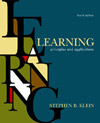 |
1 |  | 
For Hull, mechanistic S-R connections lead us to reward; for Tolman, we follow a(n) |
|  | A) | innate directional guidance system. |
|  | B) | cognitive map. |
|  | C) | internal cohesive malleable structure. |
|  | D) | concentric spiral. |
 |
 |
2 |  | 
Latent-learning studies established that __________ is/are not always necessary for learning to occur. |
|  | A) | experience |
|  | B) | fixed action patterns |
|  | C) | reward |
|  | D) | motivation |
 |
 |
3 |  | 
An associative-link expectancy represents the |
|  | A) | Pavlovian conditioning aspect of an expectancy. |
|  | B) | operant conditioning aspect of an expectancy. |
|  | C) | instrumental conditioning aspect of an expectancy. |
|  | D) | vicarious conditioning aspect of an expectancy. |
 |
 |
4 |  | 
The irrelevant incentive effect described by Dickinson and Nicholas was due to |
|  | A) | operant conditioning. |
|  | B) | instrumental conditioning. |
|  | C) | Pavlovian conditioning. |
|  | D) | vicarious conditioning. |
 |
 |
5 |  | 
According to Seligman (1975), _____________ is the "common cold of psychopathology." |
|  | A) | paranoia |
|  | B) | agoraphobia |
|  | C) | depression |
|  | D) | schizophrenia |
 |
 |
6 |  | 
Acquiring the belief that events are unrelated and out of our control can lead to |
|  | A) | HIV. |
|  | B) | phobias. |
|  | C) | mania. |
|  | D) | depression. |
 |
 |
7 |  | 
Behavioral symptoms of learned helplessness include emotional disturbance, cognitive deficits, and: |
|  | A) | suicidal ideation. |
|  | B) | motivational deficits. |
|  | C) | hallucinations. |
|  | D) | dissociative personalities. |
 |
 |
8 |  | 
When subjects in a learned helplessness task expect that their behavior will not influence environmental events, they have developed a(n) |
|  | A) | cognitive deficit. |
|  | B) | chronic phobic obsession. |
|  | C) | motivational deficit. |
|  | D) | emotional deficit. |
 |
 |
9 |  | 
A study by Miller and Seligman (1973) found that depressed people |
|  | A) | show only one episode of learned helplessness. |
|  | B) | show no extinction of conditioned fear. |
|  | C) | will always show learned helplessness. |
|  | D) | retain the expectation of failure even when successful. |
 |
 |
10 |  | 
An individual is more likely to become depressed if he or she believes that personal problems are due to internal, stable, and ___________ factors. |
|  | A) | global |
|  | B) | specific |
|  | C) | unstable |
|  | D) | external |
 |
 |
11 |  | 
When the environment is structured such that no one can control future events, we suffer from |
|  | A) | personal helplessness. |
|  | B) | earthly helplessness. |
|  | C) | universal helplessness. |
|  | D) | global helplessness. |
 |
 |
12 |  | 
Phobic behavior is motivated by fear, which leads to ______________ behavior. |
|  | A) | escape |
|  | B) | punished |
|  | C) | avoidance |
|  | D) | learned helplessness |
 |
 |
13 |  | 
Which neurotransmitter found in the locus coeruleus has been implicated in learned helplessness? |
|  | A) | acetylcholine |
|  | B) | serotonin |
|  | C) | norepinephrine |
|  | D) | GABA |
 |
 |
14 |  | 
The belief that one can or cannot execute a particular action is called |
|  | A) | expectancy-outcome attribution. |
|  | B) | efficacy expectation. |
|  | C) | behavior-response expectation. |
|  | D) | response-outcome devaluation. |
 |
 |
15 |  | 
Bandura felt that ___________ was/were an effective treatment for phobias. |
|  | A) | modeling |
|  | B) | electroconvulsive shock therapy |
|  | C) | anti-anxiety drugs |
|  | D) | dream interpretation |
 |



 2002 McGraw-Hill Higher Education
2002 McGraw-Hill Higher Education